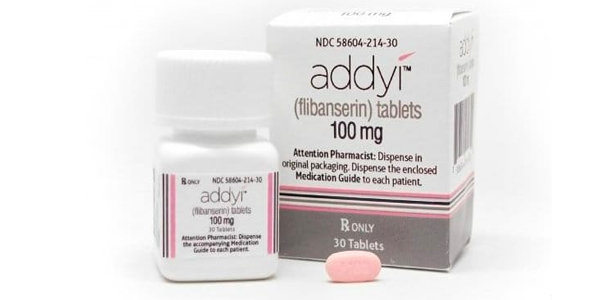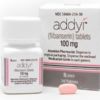Flibanserin
- Generic: Addyi
-
( 1 Review )Rated 5.00 out of 5 based on 1 customer rating01
From $266.58
Originally designed as an antidepressant, Addyi was repurposed for women who have not gone through menopause and have a low sexual desire. Addyi – generic name Flibanserin – can be used in cases where the cause of low sexual desire is not related to medical disorders, mood or psychiatric disorders or as a side effect from other medications or drugs. Addyi is not a sexual performance enhancer nor should it be used to treat relationship problems. Women who have already gone through menopause should not use Addyi, nor is it suitable for use by men. The causes of low sexual desire in cases treatable with Addyi are likely complicated and certainly not well known. Brain neurotransmitter levels (dopamine, serotonin, norepinephrine) likely have a strong influence.
What Is Addyi Used To Treat
Low sexual desire
Low sexual desire can cause marked distress and interpersonal difficulties. Speaking with a doctor about low sexual desire will open up treatment avenues. A risk evaluation and mitigation strategy performed by the doctor will assess whether or not Addyi is appropriate, and interviews regarding medical history, alcohol usage history, and any other questions the doctor has should be answered honestly so as to minimize risk and maximize treatment efficacy. Pharmacies must be enrolled in the Addyi REMS program in order to supply the medication. Most common dosage is 100 mg taken orally at bedtime. Improvement of symptoms can take up to 8 weeks; discontinuation is recommended after this amount of time if no improvement is noticed. Side effects / adverse reactions generally are noticed within 14 days of treatment.
Technical Info
– Classification: multifunctional serotonin agonist and antagonist (MSAA)
– Treats premenopausal women for acquired or generalized hypo-active sexual desire disorder (HSDD)
– Strong CYP3A4 inhibitor use should be stabilized for 2 weeks before initiating Addyi doses; following the last dose of Addyi, CYP3A4 inhibitors should be delayed for 2 days.
– Bioavailability for healthy women is around 33%. Food increases the extent of absorption while slowing the rate, especially high fat meals. Low weight individuals have shown higher exposure of about 1.4 times.
– Specific mechanism of action of Addyi is not known.
Risk Factors
Alcohol and drug abuse history can be risky if abused while using Addyi. The following are other common risk factors:
– liver problems
– low blood pressure (risk for fainting)
– marijuana or other sedative substances
– certain prescriptions and herbals (St. John’s Wort, ginkgo, resveratrol)
– pregnancy (passes into breast milk)
Interactions with medications
– azole antifungals (fluconazole, ketoconazole)
– calcium channel blockers (diltiazem, verapamil)
– macrolide antibiotics (rifabutin, rifampin)
– seizure medications (carbamazepine, phenytoin)
– opioids
– sleeping meds and anxiety treatments (alprazolam, lorazepam, zolpidem)
– muscle relaxants (cyclobenzaprine, carisoprodol)
– antihistamines (cetirizine, diphenhydramine)
– cough or flu medicines
– SSRI medications
– antibiotics, antivirals, HIV or AIDS medicines, heart medications (particularly over the counter cimetidine, ranitidine)
Many of these exacerbate drowsiness and lower blood pressure. Also avoid:
– Alcohol consumption
– Eating grapefruits or drinking grapefruit juice (potentiator – can increase side effect potential)
– hormonal contraceptives (increased dizziness, fatigue)
The list of known interactions is much more comprehensive than the above and can be found online or through a doctor.
Side Effects
Typical, common effects include drowsiness, dry mouth, insomnia, nausea, lethargy or dizziness. These are not serious unless persistent. Fainting as a result of low blood pressure can be dangerous, however. Hypertension risk has been assessed around 0.2% when Addyi is taken alone, but has been seen in 17% of cases when taken with 0.4 g/kg of alcohol, exhibiting substantial reductions in blood pressure which can lead to syncope and medical intervention. When alcohol consumption reached levels of 0.8 g/kg, 25% experienced orthostatic hypotension. Less common but more unpleasant effects can include anxiety, constipation, abdominal pain, menstrual spotting or vertigo. Serious side effects are rare but could include rash, itching/swelling, trouble breathing or severe dizziness.
Concluding Remarks
Addyi / Flibanserin, although FDA approved for treating HSDD, have yielded marginal benefits upon recent systematic reviews. As alternatives, bremelanotide (approved in 2019), short term testosterone supplementation, and even the common antidepressant bupropion have been suggested. In 2010, a US advisory panel the the Food and Drug Administration (FDA) voted to stop recommending Addyi due to what was considered an “inadequate risk-benefit ratio.” Since, development was discontinued by pharmaceutical company Boehringer Ingelheim and new studies initiated in 2013. By late 2015 Addyi was approved by the FDA with a more comprehensive profile.
Additional information
| Dosage | 100mg |
|---|---|
| Quantity | 12, 20, 32, 60 |




by Jane Robertson
As a female, sometime it is hard to get going sexually due to stress. Luckily my friend recommended me to Flibanserin. With it, I was able to satisfy my boyfriend and our relationship is better than ever.